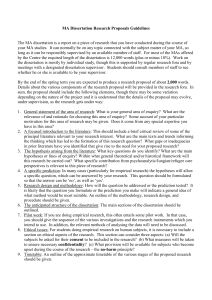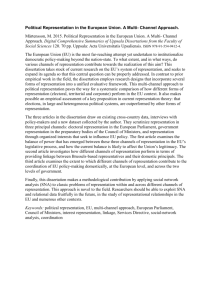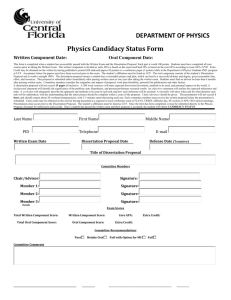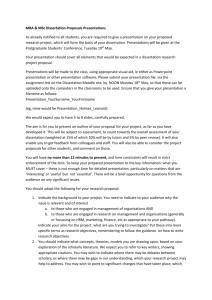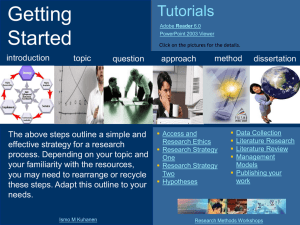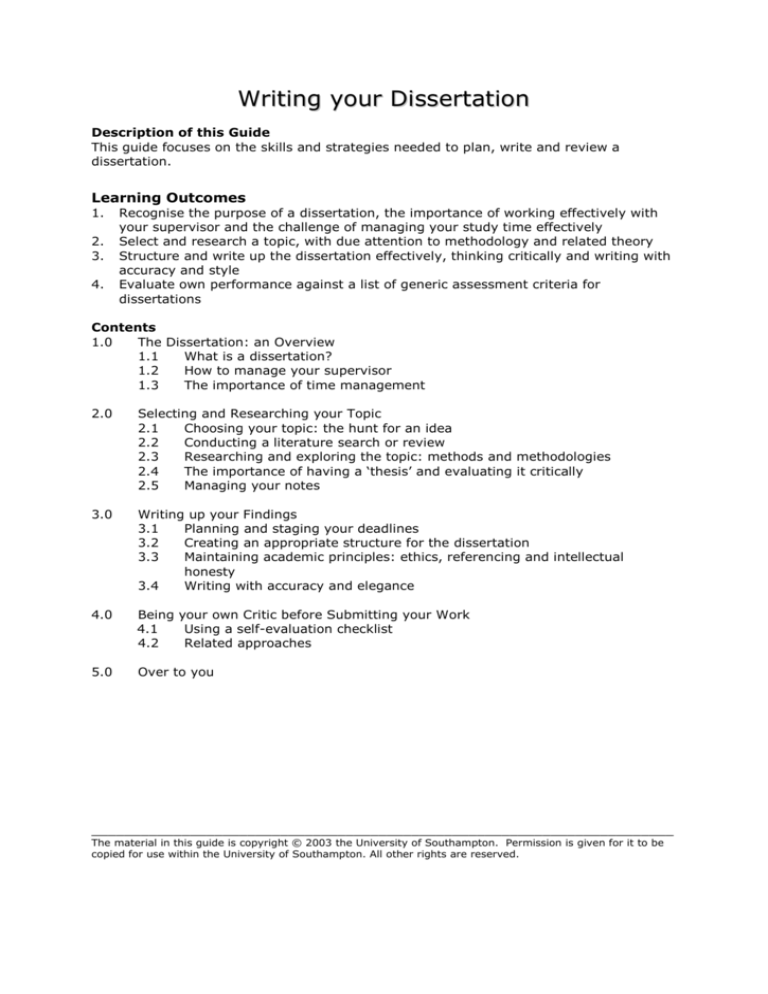
Writing your Dissertation
Description of this Guide
This guide focuses on the skills and strategies needed to plan, write and review a
dissertation.
Learning Outcomes
1.
2.
3.
4.
Recognise the purpose of a dissertation, the importance of working effectively with
your supervisor and the challenge of managing your study time effectively
Select and research a topic, with due attention to methodology and related theory
Structure and write up the dissertation effectively, thinking critically and writing with
accuracy and style
Evaluate own performance against a list of generic assessment criteria for
dissertations
Contents
1.0
The Dissertation: an Overview
1.1
What is a dissertation?
1.2
How to manage your supervisor
1.3
The importance of time management
2.0
Selecting and Researching your Topic
2.1
Choosing your topic: the hunt for an idea
2.2
Conducting a literature search or review
2.3
Researching and exploring the topic: methods and methodologies
2.4
The importance of having a ‘thesis’ and evaluating it critically
2.5
Managing your notes
3.0
Writing up your Findings
3.1
Planning and staging your deadlines
3.2
Creating an appropriate structure for the dissertation
3.3
Maintaining academic principles: ethics, referencing and intellectual
honesty
3.4
Writing with accuracy and elegance
4.0
Being your own Critic before Submitting your Work
4.1
Using a self-evaluation checklist
4.2
Related approaches
5.0
Over to you
_______________________________________________________________________
The material in this guide is copyright © 2003 the University of Southampton. Permission is given for it to be
copied for use within the University of Southampton. All other rights are reserved.
Writing your Dissertation
Dissertations have become an increasingly important component of Higher Education
over the past few years, and are often included in third level undergraduate work, as well
as forming an important part of any Masters level programme. Dissertations provide you
with an opportunity to work independently, at length, on a topic that particularly
interests you. It is also an effective means of research training, which helps to develop
advanced intellectual skills such as evaluation, analysis and synthesis, as well as
management skills. This guide gives advice about how to approach, undertake and
evaluate your own dissertation, so that you can make the most of this challenge.
Using this guide
The following advice is made up of four parts:
1.
The
dissertation: an
overview
2.
Selecting and
researching your
topic
3.
Writing up your
findings
4.
Being your
own critic
What is a
dissertation?
Choosing a topic:
the hunt for an idea
How to manage
your supervisor
Conducting a
literature search or
review
Planning and
staging your
deadlines
Using a checklist
to evaluate your
own dissertation
before you submit
it: using your
tutor’s assessment
criteria
The importance of
time management
Researching and
exploring the topic:
methods and
methodologies
The importance of
having a ‘thesis’ and
evaluating it critically
Managing your notes
Creating an
appropriate structure
for the dissertation
Maintaining
academic principles:
ethics, referencing
and intellectual
honesty
Writing with
accuracy and
elegance
2
Writing your dissertation
1.0
The Dissertation: an Overview
Skills
As preparation for a more detailed consideration of various aspects of dissertation
preparation, in this section we review what is meant by the term ‘dissertation’. We also
suggest how to ‘manage’ two key resources, your supervisor and your time.
1.1
What is a dissertation?
Before you begin to think about possible topics for investigation, make sure you are clear
in your own mind about what a dissertation is. You will be familiar with the principles of
essay writing, the most common form of academic writing, but it is worth reviewing
briefly what an essay is really designed to do, and looking at how a dissertation may
echo but also differ from a standard essay.
Different subject disciplines may emphasise different features, but, broadly speaking, an
essay is a continuous piece of writing, arranged in clearly demarcated paragraphs, in
which an argument (a clear line of thought) is developed, in response to a central
question or proposition (thesis). The line of argument is supported by evidence you have
acquired through research, which you are required to analyse, and which supports or
contradicts the various perspectives explored in the course of that argument. The essay
then reaches a conclusion in the final section, which pulls together the threads of your
argument, supporting, qualifying or rejecting the original thesis.
It is worth bearing in mind that an academic essay is not a piece of writing designed to
reproduce information available elsewhere, but something new and expressive of your
individual abilities to analyse and synthesise.
In addition, the process of academic writing will, of itself, help you to learn, by enabling
you to work with concepts and information relevant to your subject, and thereby
developing your intellectual skills. For a more detailed examination of this topic have a
look at the Writing Effectively Guide.
A dissertation follows the fundamental principles of academic writing, but bear in mind
the following key points.
It is an extended piece of writing, usually divided into chapters.
Make sure that you know the lower and upper word limits acceptable for your
dissertation, and what that will look like in terms of word-processed pages.
Be sure to find out whether you should be following a particular sequence of
chapter headings – for example, introduction followed by literature search
followed by an experiment or a survey and/or an analysis of your research - or
whether you are expected to devise your own sequence and structure.
It contains a detailed exploration of evidence. The evidence referred to may comprise
evidence from published texts, for example if you are exploring the literary texts of a
particular writer, or it may consist of primary data gathered by your own, first-hand
research, for example a sociological study of attitudes to gender roles based on research
methods such as interviews and questionnaires.
You are required to be clear about the nature of the methodology you will use for
gathering the evidence – why are you collecting data or analysing evidence in that way
rather than in another way? This can be a difficult area and there is a separate section on
it in 2.2 below.
It must be underpinned throughout by awareness of theory – your argument should be
placed within the context of existing theory relevant to the subject.
3
It has to be presented in a professionally finished manner. Your tutors should give you
precise details about the format, layout and stylistic requirements of your assignment.
Make sure that you know exactly what these are.
NOTE
Please remember that the contents of this guide are generic and that it is
important to ensure that you adapt them to meet the particular requirements of
your discipline.
1.2
How to manage your supervisor
Since a dissertation is an individually devised piece of work, you will be allocated a
personal supervisor to support you while you are writing it. Do not delay in having your
first meeting with her or him, as it is vital to discuss not only what topic you will start by
exploring, but also how you can best work on your dissertation. In order to help your
supervisor help you, have a go at the short self-analysis quiz below and take your
responses with you to your first meeting.
Which of the following statements apply to you?
Statement
Yes/No
1
I am good at managing my own work and don’t need any reminders from a
supervisor about where I should be up to, or how much time is left. Just
leave me to it.
2
I am quite good at organising my own work, but would still appreciate some
interim deadlines and reminders from time to time.
3
Time management can be a real problem for me. I tend to leave work till
the last minute and can only get going when a deadline is looming fast!
4
I do not find it easy to bother my tutors – they are all so busy, I do not like
to cause a fuss.
5
I need lots of reassurance and probably contact my tutors more often than I
really need to.
6
I am clear about the requirements of the dissertation and can translate
these into a plan for ensuring that I meet the final deadline.
The above are just some of the things students say they feel: we are
all different – we have different styles of learning and levels of
motivation. There are no right or wrong answers. However you have
responded, the challenge is to establish the best way of working with
your supervisor.
4
Writing your dissertation
Skills
To help you further with this aspect of your dissertation the next activity is in the form of
a checklist. This consists of things that need to be considered in managing relations with
your supervisor, not just initially but throughout the period that you are working on your
dissertation.
Use the final column to note whether or not you have dealt with a particular aspect of the
dissertation process.
Aspects of managing your tutor and the dissertation
process
1
2
3
4
5
6
7
8
9
Yes/No
Let your supervisor know how much contact and support you
would like
Accept that there are limits to the amount of help that can, and
should, be given with a dissertation studied at an advanced
level
Agree together at the outset on when you will meet and how
best contact can be made (for example, by phone or by email)
Plan together some interim deadlines for the work, so that you
are able to manage your time effectively
Make sure that you know from the start how your dissertation
will be assessed – what assessment criteria will be applied to it
– and that you understand these, discussing them with your
supervisor if you need to
Ask for access, where possible, to past dissertations of the kind
you are being asked to write, so that you can get a sense of
their scope, structure, tone and the methodology used
Consider contributing to the setting up of appropriate support
groups or pairings with fellow students, so that you can clarify
your own thinking by discussing it with others if this is
acceptable to your tutor
Find an appropriate way of mapping and monitoring your own
progress; for example, by using a checklist of tasks to be
completed. Use this to help the discussions with your
supervisor to focus on areas where you need particular advice
Listen to, evaluate and respond to your supervisor’s feedback,
by making notes and reflecting on what has been said or
written, then applying the feedback to the next stage of your
research or writing up
Aspects 1 to 4 relate to the setting of ground rules with your
supervisor and as such need to be agreed as early as possible. Aspects
5 and 6 relate to the gathering of background information to help you
understand ‘the nature of the beast’. Aspects 7 to 9 relate to the
support available as you work towards the completion of your
dissertation. All are important and need to be closely monitored.
5
1.3
The importance of time management
Writing a dissertation can be very demanding in terms of managing your time and the
process itself. It is a major piece of work and you are likely to have months before it is
due for submission, so the dissertation sometimes causes problems even for people who
are normally good at meeting deadlines. If you know that you have a problem with
independent work, or if you think that such a major undertaking will cause problems,
make sure you read the Being and Independent Learner Guide, which is full of practical
advice about keeping on top of your work. You might also want to look at Section 3.1 in
this guide, which is about organising your weekly schedule, and mapping out the weeks
available to you.
2.0
Selecting and Researching Your Topic
When you have been used to having essay questions and assignment topics set for you,
it can be difficult to decide what to do when you have been given some freedom in this
respect. There is also a risk that the freedom might go to your head so that you take on
more than you can cope with in the time available. When deciding on a subject for your
dissertation keep in mind the research requirements, and be guided by the adage ‘the
narrower and more specific the better’. If you are unsure consult your supervisor.
2.1
Choosing your topic: the hunt for an idea
So how do you choose a topic in the first place? You will probably already have an
inkling about the kind of topic that appeals to you, and it’s likely that you will have been
asked to engage in background reading before the start of the term or semester in which
you begin your dissertation unit. This should narrow down the possibilities. Finding a
topic of particular interest is a bit like a treasure hunt – you pick up an interesting idea,
perhaps from something you have read or discussed in class, and follow it up through
published texts such as books, journals, and websites by following up references, until
you fix on a particular aspect which you feel needs to be addressed. Look at the
Developing an Effective Search Strategy Guide for practical advice about how to do this.
Keep the following points in mind:
2.2
Is the topic of academic significance, and not trivial? It would be possible to find
out whether Shakespeare used the word ‘and’ more often in his comedies than in
his tragedies, but would it be of genuine interest??
Is the topic really manageable in the time available? It is a common mistake to
imagine that you can cover far more than is actually feasible, so keep a suitably
narrow focus. Do not ask too big a question. Make sure that you take advice from
your supervisor on this.
Be aware of your own standpoint – your own take on the topic. How do your own
attitudes, values and beliefs affect your research? No one can be entirely
objective – be honest about your own interests and values.
As early as possible, write down your thesis – the proposition that you are
investigating. Keep this to hand whenever you are analysing evidence or writing
out your argument, so that you do not fall into the trap of simply collecting facts
rather than unfolding a clear argument relating to a narrowly defined issue. See
Section 2.4 for more on this.
Conducting a literature search or review
In order to write with confidence about your topic, you will need to read what members
of the academic community have already been said about it. Take advice from library
staff on this, and read the Developing an Effective Search Strategy Guide to ensure that
you know how to access relevant material in a variety of formats. Always ask for
guidance from staff – do not avoid looking at a particular resource because you are not
sure how to access it. Library staff are there to help you do exactly this.
6
Writing your dissertation
Skills
Remember to look for up-to-date references to the topic. There may well be classic
texts, particular relating to underpinning theories, but you should also see what has been
said in recent years. The availability of electronic journals will help greatly with this, as
they are easily searchable. Look at the library website on www.library.soton.ac.uk and
click on the ‘Electronic resources’ button – but, if in doubt, ask a member of library staff
to help you.
2.3
Researching and exploring your topic: methods and methodologies
Research is a form of learning, or finding out. When you find out anything, you do it in a
particular way, or using a particular methodology, even if you are not aware of it. If you
are a third year student, and particularly if you are a Masters level student, you should
be aware of the methodology you are adopting in your search for evidence, and of where
that methodology fits in the spectrum of possible approaches. For example, it is common
to read about quantitative research and qualitative research.
Quantitative research is based on scientific method. It purports to be as objective as
possible, and is often based on statistics or other measurable, empirical data.
Conclusions will be drawn from the analysis of things clearly measured.
Qualitative research is often based on subjective data items, which cannot be given a
numeric value, for example the attitudes and opinions of a range of individuals on an
issue. Anthropological study, for example, may be based on small details of people’s
experience, collected through observation. These will be described in words rather than
numbers, and statistical generalisations cannot be drawn from them.
In practice, few dissertations involve only qualitative or only quantitative methods, but
there is often a major focus on one end of the spectrum or the other. Where will your
focus lie? The answer should depend upon the kind of enquiry you are engaged in:
again, ask your supervisor for advice about this.
2.4
The importance of having a thesis and evaluating it critically
Remember that you are constructing an argument or defending a thesis, from the
beginning to the end of your assignment. Keep your thesis – the statement you are
defending or central argument you are asserting – in the forefront of your mind as you
write. Think of this central idea, and the logical development of your argument (train of
thought) around this, as being the central path of your dissertation, and make sure that
you do not have sections or paragraphs which are somewhere in the shrubbery out of
sight of the main path. Every paragraph should further the central argument, by
providing another angle on it, additional evidence, and evaluation of that evidence in
relation to the central thesis.
2.5
Managing your notes
With a long assignment of this nature it is essential that you manage your notes well
from the start of your research to the editing of the final version of the dissertation.
Organise them using methods that suit your learning style (see Understanding Your
Learning Style Guide), and make sure that you keep detailed notes of all of the
references you will want to use, including a detailed bibliography (see the Referencing
Your work Guide and Using Endnote Bibliographic Software Guide for further help on
this).
3.0
Writing up Your Findings
As you carry out your research it is important to remember that the time you have at
your disposal is limited, and that the effort you put into this aspect of your dissertation
7
needs to be reflected in the end product. To this end it is essential to plan your strategy
and think about the overall structure of your dissertation sooner rather than later. Try to
ensure that your research effort is aligned with the way in which your dissertation will be
structured.
3.1
Planning and staging your deadlines
3.1.1 ORGANISING YOUR WEEKLY SCHEDULE
Draw a typical week’s timetable on a large sheet of paper (there is a copy of a blank
timetable in the Being an Independent Learner Guide that you could use). Show every
day, whether or not you have any lectures or classes, and write or draw in the ‘fixtures’
for each week – your University timetable, and other regular commitments such as parttime work and regular social events.
Once you have marked in the essentials, as you see them, take a good look at where you
could commit time. Look for slots of between 30 minutes and 2 hours (your brain starts
to slow down when you have been working for more than 2 hours) – to spend on your
dissertation. Look particularly for those odd hours which are easily frittered away doing
nothing much, and see if you can turn these into study time, so that some clear chunks
of time are left for you to relax, keep fit, go shopping, watch TV and so on.
Now fill in your timetable with personal study periods. When are you going to work on
your dissertation, and when on your other commitments? Take account of when you are
at your best for studying – for example, can you work early in the morning or late at
night? Think, too, about where you will study, and make sure that you know of a place
where you can actually get on with your own work, whether it is a study area at
University, a library or computer room, or a quiet place where you live. Use colours to
mark out on your weekly chart your free time and any other activities – it is easier to see
the pattern.
Be realistic – do not aim for the impossible. But make sure you get a reasonable number
of study sessions in each week in which you will only work on your dissertation.
Once you have found a reasonably regular pattern of study that suits you, look for ways
of prioritising the work that needs to be done. Keep a list of everything you have to do,
and everything that is not vital, but would be good to do (like background reading,
additional research on the internet and so on). Use you first study session each week to
review the list, and make a note of what needs to be done that week, and anything
additional that you would like to do. Use a diary to pencil in roughly how your study
times will be used.
Use every trick you can think of to persuade – or bribe – yourself to stay committed to
your study times. (You will probably want to review your study timetable every few
weeks, to see whether it is working for you.) Regular work throughout your dissertation
unit will mean less chance of any all-night, last-minute, nail-biting sessions during the
week before it needs to be submitted.
3.1.2 MAPPING OUT THE WEEKS AHEAD OF YOU
Do not just bumble along for the first few weeks, thinking you have months ahead of you
to spend on your dissertation – time passes quickly.
At the outset, and preferably in collaboration with your supervisor, map out a timetable
of sub-tasks and interim deadlines on the following grid, or something like it adapted to
8
Writing your dissertation
Skills
your own needs. Undergraduate dissertations are likely to be shorter and have less time
for study and any primary research than postgraduate dissertations, so bear this in mind.
Look at this example of an action plan, and devise one for yourself, which is suitable for
your own context, subject discipline and length of time available.
Wk
no.
Main task to be completed
by end of this week:
1
Background reading
2
Finalise topic and title
3
Literature search – what has
already been written about your
topic? Seek out up-to-date
resources, asking for help from
library staff
4
Dissertation plan, informed by
your literature search
5
Develop dissertation plan
6
7
8
9
Gathering evidence or data
Gathering evidence or data
Gathering evidence or data
Use initial findings to begin to
draft the dissertation
Refine assignment plan and
develop draft, referring to selfevaluation checklist in Section 4
10
11
12
13
Continue drafting and refining
Complete draft
Apply self-evaluation checklist
again
14
Produce final assignment
Find time this week also to
explore:
Follow interesting ‘trails’, until one
leads to a provisional question or
‘thesis’
More background and focused reading
on your chosen aspect of the topic
Investigate methodological issues,
implications of particular methods and
ethical issues. See the Developing an
Effective strategy Guide and Using
Endnote Bibliographic Software Guide
for help with constructing and
maintaining a bibliography
Reflect on methodological issues in
writing and revising your dissertation
plan
Begin to conduct your research and
gather evidence or data
Begin to analyse evidence or data
Begin to analyse evidence or data
Continue to analyse and evaluate
evidence or data
Focus on adopting an appropriate
academic tone and style, together with
accurate, reader-friendly presentation
of evidence
Refine style
Last refinements of written style and
presentation; final check of data and
its presentation
Possible
interim
deadlines
Agreement of title
Brief annotated
bibliography
Overview of
design of
dissertation plan
Interim report to
supervisor
Completed draft
Submit
dissertation
Take your plan to a meeting with your supervisor. It will help to
structure your discussion and should impress him or her.
9
3.2
Creating an appropriate structure for the dissertation
It is important to be clear about the structure of your dissertation, to ensure that your
ideas are clearly and logically presented to your reader, so that your argument, with it is
supporting evidence, can be followed. You will need a clear introduction, followed by the
main body of your argument, and then a conclusion, but make sure that you talk to your
supervisor about how your assignment should be structured. There may also be written
guidance on this aspect in your School.
Try noting down your provisional chapter headings here, together with a
few initial thoughts on the contents of each chapter.
Again, once you have done this take it to the next meeting with your
supervisor to check that you are on the right lines.
3.3
Maintaining academic principles: ethics, referencing and
intellectual honesty
It is absolutely vital with a dissertation, as with all academic work, that your assignment
meets the required standards in terms of ethics, accurate referencing and intellectual
honesty.
3.3.1 ETHICAL STANDARDS
All research must be carried out in an ethical manner, without exploiting others or
breaking agreed ethical rules. Your own discipline will have a set of ethical standards to
which you must adhere: make sure that you know what these are, and take advice from
your supervisor about any ethical issues arising from the nature of your particular study.
10
Writing your dissertation
3.3.2 REFERENCING AND INTELLECTUAL HONESTY
Skills
Make sure, too, that all of your references to other people’s work are made accurate
and in accordance with the academic conventions of referencing, citations and
bibliographies appropriate for your subject discipline – see the Referencing Your Work
Guide for more information about this. It is vital that all ideas and arguments drawn
form the work of others are acknowledged, to ensure that you are not open to
accusations of plagiarism, or passing off the ideas or words of others as if they are
your own. Your dissertation should be your work, made up of your evaluation of
evidence relevant to your central argument.
3.4
Writing with accuracy and elegance
Remember to check the accuracy and style of your own writing. Communicate as clearly
as possible, in a style appropriate for serious academic work, but avoiding the use of
difficult sentence constructions wherever possible. For more advice on this subject see
the Writing Effectively Guide .
4.0
Being your own Critic before Submitting your Work
There is much to be gained from critiquing your own work; by now you may have
become used to doing this before submitting your assignments. If not, it is particularly
important to do so with such a substantial piece of work as a dissertation.
4.1
Using a self-evaluation checklist
You may find the following grid useful in checking aspects of your work. Depending on
your subject discipline, you will probably find some terms and some categories more
useful and important than others, but this is a generic overview of the kinds of criteria
markers use for dissertations. Make sure that you also have in front of you a copy of the
specific marking criteria for your dissertation: these should be available from your School
or Faculty, and are often to be found on your subject website. If you cannot find these
criteria, ask!
Clearly, for this checklist to be of any real value, you need to be use it while there is still
time to address those questions where your answer is ‘no’, or seek further guidance
where your response is ‘not sure’. Thus, in Section 3.1 it is suggested that you apply it in
Weeks 10 and 13.
Questions
1
Yes/No/
Not sure
Dissertation topic
Is the topic clear and well defined? Does it involve a problem, question, or
hypothesis that sets the agenda and points precisely to what needs to be
explored or discovered?
Is the topic of genuine relevance or interest within your subject discipline? Does
it pick up on important or interesting themes or subjects arising from your
studies?
11
2 Literature review
Have you accessed the most recent literature of relevance to your topic,
as well as seminal sources from the past?
Do you refer to major books, articles, artefacts? Since quality is more important
than quantity – how well have you selected your material?
Does the literature review hang together, to show how the ideas and findings
have developed, or is it merely a shopping list of books and articles?
Is the review critical? Does it briefly evaluate, showing how your dissertation fits
into what is mistaken or lacking in other studies? The literature review should
provide a critically appraised context for your studies.
3
Theoretical underpinnings
Does theory permeate the structure from beginning to end, from statement of
problem to conclusion? Are you asking yourself a key question, presenting a
thesis, or defending a statement? Be clear about your approach.
Theory is the framework of your study – not a luxury. Your dissertation will be
judged, in part, by how well you express and critically understand the theory you
are using, and how clearly and consistently it is connected with the focus and
methodology of your dissertation.
4
Methodology
Two chief criteria:
Is your choice of methods and research techniques well suited to the kind of
problem you are studying? Methods work if they provide a persuasive response
to your question, positive or negative.
Is your description of the methods you have adopted clear enough to take a
blueprint and replicate?
5
Results
Are your findings faithful to what you actually found – do you claim more than
you should? Don’t ‘massage’ your evidence or findings…
Have you provided enough evidence to make a convincing case?
Have you presented everything directly relevant to the question in such a way
that the reader doesn’t have to flip back and forth to make her or his own
connections?
Are results or findings clearly and accurately written, easy to read, grasp and
understand?
6
Conclusions
Have you answered the question ‘So what?’. What should we do with your
findings and conclusions? What do they imply?
Findings don’t speak for themselves – they need to be analysed. Have you
explained what your findings mean and their importance, in relation to theory
and practice?
If you have completed your checklist in Week 10 you should be able to take it to a final
meeting with your supervisor. At this meeting it can serve as an agenda to guide your
discussion and help you decide your priorities for the final stages of the dissertation
process.
12
Writing your dissertation
4.2
Related approaches
Skills
When you have written something that relates to your dissertation, always put it aside
for a few of days. In other words ‘sleep on it’. Then reread with a critical eye. Try to put
yourself in the position of someone who is interested in your topic but knows nothing
about it. Would it make sense to him or her? Have you used the best words to express
the points you are seeking to make? Where does what you have written fit into the
dissertation as a whole? Will the joins show? In considering these and similar questions
you will often be surprised at the changes you decide to make in the interests of
enhanced clarity and greater variety and elegance in the language used. The Three Rs of
competent writing are revise, revise, revise. This is especially important with a
substantial piece of work like a dissertation.
5.0
Over to You
As has been emphasised, one of the key challenges in preparing a dissertation is
consistency of effort. You must avoid the temptation to coast and cram. What you need
is someone who will act as a sounding board for your ideas and be prepared to
brainstorm with you. She or he might also act as a progress chaser. It is unlikely that
your supervisor will be able to meet all the demands that you have in this respect. Hence
there is a need to find someone else. The most likely, and most suitable person will
probably be a fellow student. In this case, you must of course be prepared to reciprocate.
While this might seem like additional pressure on your time, if you have chosen wisely
the benefits will almost certainly outweigh the costs.
13





